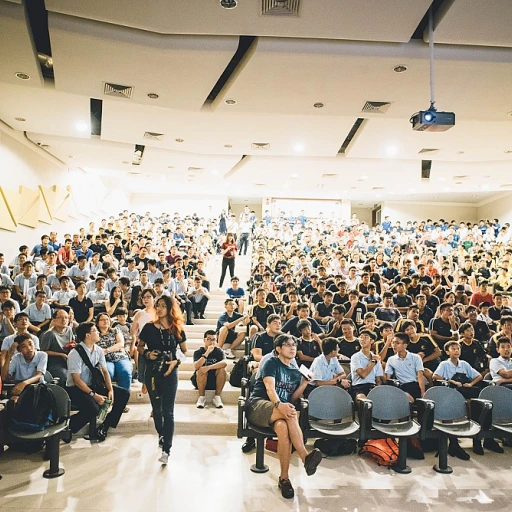
Understanding the Importance of Employee Recognition
Recognizing Employee Value as a Foundation for Business Success
Understanding the role of recognition in enhancing employee engagement is critical for any company's success. By making employees feel valued, companies can foster a positive working environment. Yet, there's more to it than throwing occasional appreciation day parties. It's about creating a lasting culture of recognition where employees' hard work is genuinely appreciated. The benefits of a robust employee recognition program are multi-fold. When employees feel acknowledged for their efforts, they are more likely to exhibit higher productivity levels and contribute to a harmonious workplace culture. Furthermore, recognizing employees on a personal level helps to build stronger team dynamics and enhances overall company culture. From celebrating small victories to instituting a comprehensive recognition program, there are numerous ways to appreciate employees' dedication. When the team knows their contributions are valued, they are more likely to remain committed to their roles. This, in turn, promotes a culture of loyalty, which is vital for lowering turnover rates, thereby safeguarding the company's resources and time. Moreover, integrating recognition initiatives tailored to individual preferences showcases a company's commitment to its workforce. Whether through customized gift ideas or public acknowledgment on social media, personalized recognition strategies can effectively reward employees and uplift their spirits. Recognizing employee contributions isn’t just about making them feel good; it's about building a thriving business environment. For more insights into fostering effective teamwork, visit this guide on teamwork performance reviews.Personalized Recognition Approaches
Creating Lasting Impressions with Personalized Recognition
Recognition in the workplace isn't a one-size-fits-all solution. Personalizing the way we celebrate employee achievements is paramount to fostering an environment where individuals feel truly valued. Here are some effective methods to ensure recognition efforts are genuinely appreciated:- Tailored Rewards: Not every employee finds motivation in the same types of rewards. Some might appreciate a simple gift card to their favorite store, while others could cherish an extra day off. Understanding individual preferences can turn a generic reward program into a thoughtful experience.
- Thoughtful Appreciation: Recognize employees in ways that reflect their personal contributions and work style. Rather than a generic 'employee of the month' title, tailor the acknowledgement to specific accomplishments and the unique strengths they bring to the team.
- Celebrating Success: Incorporate personal achievements into team building activities or company-wide events. When employees see their hard work recognized in front of their peers, it boosts morale and encourages a culture of appreciation.
- Direct Manager Interaction: Having a direct conversation with managers can add a 'personal touch' to recognition. This can be done through a one-on-one meeting where the employee's dedication and contributions are acknowledged sincerely.
Implementing Peer-to-Peer Recognition Programs
Fostering a Culture of Peer-to-Peer Recognition
In today's dynamic workplace, fostering a positive culture that celebrates employees' hard work and dedication can significantly impact both employee engagement and the overall company culture. Peer-to-peer recognition programs can be a highly effective strategy in achieving this. These programs not only empower employees to recognize each other's contributions but also cultivate a sense of camaraderie and mutual appreciation among team members. Peer recognition can be a low-cost yet impactful way to boost morale and help employees feel valued. Creating opportunities for team members to celebrate each other encourages a supportive atmosphere, where hard work is genuinely appreciated and rewarded.- Empowering Employees: Allow team members at all levels to participate in recognizing their peers. This can range from writing appreciation notes, giving shout-outs during meetings, or even highlighting exceptional efforts on internal social media platforms.
- Personal Touches: Personalized recognition goes a long way in making employees feel appreciated. Encourage employees to share stories of how their colleagues have helped them or contributed to a project. This not only boosts the recognized employee's morale but also strengthens team dynamics.
- Diverse Recognition Methods: Consider offering a variety of ways to acknowledge contributions, such as awarding top performers with gift cards or organizing a monthly employee appreciation day.
- Integration with Company Values: Ensure the recognition program aligns with the core values of your company's culture. When recognition is tied to these values, it reinforces the kind of behavior that is most beneficial to the company as a whole.
- Encouraging Frequent Recognition: Make recognition a part of the daily routine. It doesn't always have to be grand; small acts of appreciation throughout the day can steadily build a more supportive workplace environment.
Utilizing Technology for Employee Recognition
Revolutionize Recognition with Digital Tools
The digital age offers countless opportunities to transform employee recognition into an engaging and seamless process. Leveraging technology can revolutionize how companies acknowledge their workforce’s hard work while fostering a strong culture of appreciation.
Implementing digital tools can make it easier to recognize employee achievements consistently. A great way to start is by introducing an employee recognition platform that allows employees to give and receive shout-outs for their top performances. This not only encourages peer recognition but also reinforces a company-wide appreciation culture.
Social media can play a significant role in boosting employee appreciation. Consider using your company's social channels to publicly recognize outstanding performances or celebrate an ‘Employee of the Month’. Such gestures help employees feel valued and appreciated while also bolstering team morale.
Another effective idea is to send personalized digital gift cards as a direct reward to employees who go above and beyond. It’s a small yet impactful way to celebrate individual successes!
Technology also enables the automation of recognition processes. By setting up automated messages to celebrate work anniversaries or birthdays, employees receive timely acknowledgment without adding to HR's workload. Such initiatives can contribute to higher employee engagement and help maintain a positive workplace atmosphere.
With numerous low cost digital solutions available, there’s no shortage of ways to make your recognition program more dynamic. Investing time in exploring these options can deliver substantial rewards in building a cohesive and motivated team.
Measuring the Impact of Recognition Initiatives
Assessing Recognition Initiatives Effectiveness
To truly make the most of your company's employee appreciation efforts, measuring the impact of recognition initiatives is crucial. Gathering data on how these programs influence employee engagement, work satisfaction, and company culture is not merely an option but a necessity for continuous improvement.- Track Employee Feedback: Regular surveys and feedback forms can give insights into how employees feel about the recognition programs. Understanding their perspectives helps refine approaches for more impactful employee recognition.
- Analyze Key Metrics: Metrics such as retention rate, productivity stats, and employee satisfaction scores are vital. Improved retention rates often correlate with effective recognition, indicating that employees feel valued and engaged in the workplace.
- Collect Peer-to-Peer Insights: Peer recognition brings a unique perspective to your appraisal processes. By reviewing peer insights, you can discover lesser-seen contributions within the team that deserve recognition, aiding in the creation of a more inclusive appreciation culture.
- Evaluate Reward Programs: Determine which recognition ideas resonate most from gift cards to recognition days. Analyzing which rewards consistently have a positive effect can help tailor your recognition program to maximize impact.
- Utilize Social Media: Employee achievements shared on social platforms can amplify recognition benefits. Track engagement on these posts to assess external appreciation and its effect on both personal and company morale.
Overcoming Challenges in Employee Recognition
Addressing Common Obstacles in Employee Recognition
Recognizing employee contributions is crucial for fostering a positive workplace culture, but it comes with its own set of challenges. Companies often struggle with implementing effective recognition programs that truly resonate with their employees. Here are some common obstacles and strategies to overcome them:
- Inconsistent Recognition: One of the top challenges is the inconsistency in recognizing employees. To combat this, companies should establish a structured recognition program that ensures regular acknowledgment of employee achievements. This could be as simple as setting aside time during team meetings to celebrate accomplishments.
- Lack of Personalization: Employees feel more valued when recognition is personal. It's important to tailor appreciation efforts to individual preferences, whether through personalized notes, small gifts, or public acknowledgment. This approach aligns with personalized recognition strategies discussed earlier.
- Budget Constraints: Many organizations believe that effective recognition requires significant financial investment. However, there are numerous low-cost ways to recognize employees, such as verbal praise, social media shout-outs, or an employee appreciation day. These methods can be just as impactful as monetary rewards.
- Employee Engagement: Ensuring that all team members are engaged in the recognition process can be challenging. Implementing peer recognition programs can help in this regard, as they encourage employees to recognize each other's hard work, fostering a culture of appreciation.
- Measuring Impact: Companies often find it difficult to measure the impact of their recognition initiatives. It's essential to set clear metrics and regularly assess the effectiveness of recognition programs. This can include tracking employee satisfaction surveys or monitoring changes in employee engagement levels.
By addressing these challenges, companies can create a more inclusive and appreciative workplace culture. Recognizing employees not only boosts morale but also enhances overall company performance.













